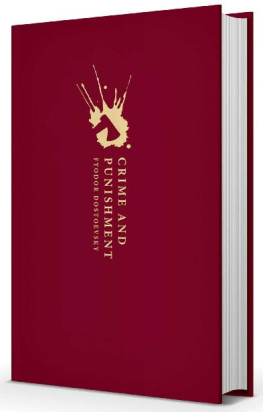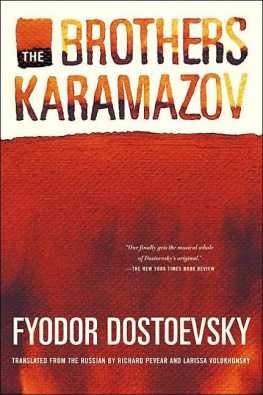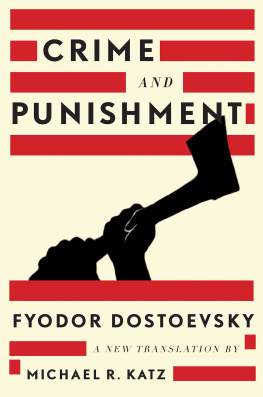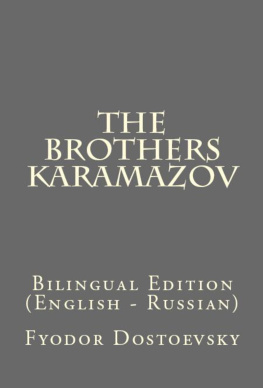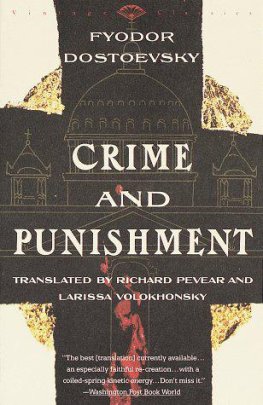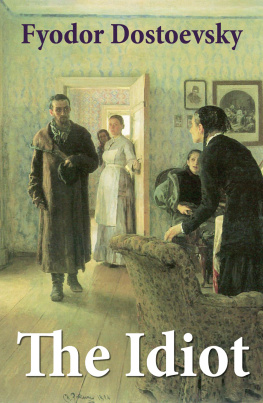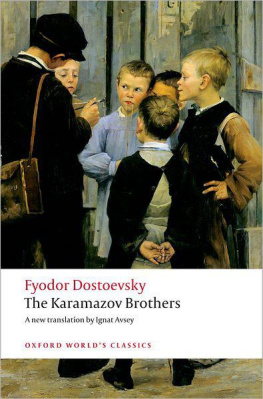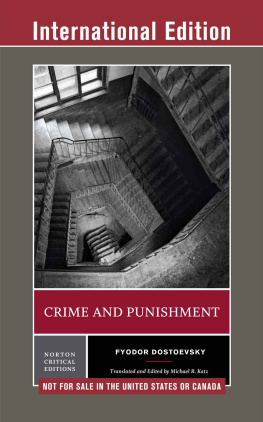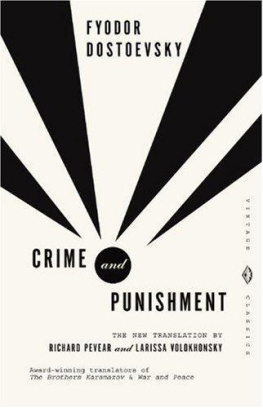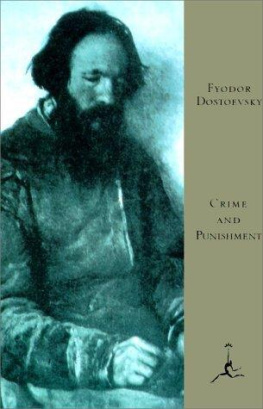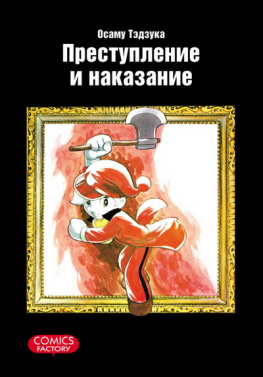Fyodor Dostoevsky - Crime and Punishment (Oxford World’s Classics)
Here you can read online Fyodor Dostoevsky - Crime and Punishment (Oxford World’s Classics) full text of the book (entire story) in english for free. Download pdf and epub, get meaning, cover and reviews about this ebook. year: 2017, publisher: Oxford, genre: Detective and thriller. Description of the work, (preface) as well as reviews are available. Best literature library LitArk.com created for fans of good reading and offers a wide selection of genres:
Romance novel
Science fiction
Adventure
Detective
Science
History
Home and family
Prose
Art
Politics
Computer
Non-fiction
Religion
Business
Children
Humor
Choose a favorite category and find really read worthwhile books. Enjoy immersion in the world of imagination, feel the emotions of the characters or learn something new for yourself, make an fascinating discovery.
- Book:Crime and Punishment (Oxford World’s Classics)
- Author:
- Publisher:Oxford
- Genre:
- Year:2017
- Rating:4 / 5
- Favourites:Add to favourites
- Your mark:
- 80
- 1
- 2
- 3
- 4
- 5
Crime and Punishment (Oxford World’s Classics): summary, description and annotation
We offer to read an annotation, description, summary or preface (depends on what the author of the book "Crime and Punishment (Oxford World’s Classics)" wrote himself). If you haven't found the necessary information about the book — write in the comments, we will try to find it.
Fyodor Dostoevsky: author's other books
Who wrote Crime and Punishment (Oxford World’s Classics)? Find out the surname, the name of the author of the book and a list of all author's works by series.
Crime and Punishment (Oxford World’s Classics) — read online for free the complete book (whole text) full work
Below is the text of the book, divided by pages. System saving the place of the last page read, allows you to conveniently read the book "Crime and Punishment (Oxford World’s Classics)" online for free, without having to search again every time where you left off. Put a bookmark, and you can go to the page where you finished reading at any time.
Font size:
Interval:
Bookmark:
oxford worlds classics
CRIME AND PUNISHMENT
Fyodor Mikhailovich Dostoevsky was born in Moscow in 1821, the second in a family of seven children. His mother died of tuberculosis in 1837, and his father, a generally disliked army physician, died in apparently suspicious circumstances on his estate two years later. In 1843 he left the College of Military Engineering in St Petersburg and devoted himself to writing. Poor Folk (1846) met with great success from the literary critics of the day. In 1849 he was imprisoned and sentenced to death on account of his involvement with a group of utopian socialists, the Petrashevsky circle. The sentence was commuted at the last moment to penal servitude and exile, but the experience, described in Memoirs from the House of the Dead (18612), radically altered his political and personal ideology. In 1857, while still in exile, he married his first wife, Maria Dmitrievna Isaeva, returning to St Petersburg in 1859. In the early 1860s he founded two new literary journals, Time and The Epoch, and proved himself to be a brilliant journalist. He travelled in Europe, which served to strengthen his anti-European sentiment. Both his wife and his much-loved brother, Mikhail, died in 1864, the same year in which Notes from the Underground was published; Crime and Punishment and The Gambler followed in 1866, and in 1867 he married his stenographer, Anna Snitkina, who managed to bring an element of stability into his frenetic life. His other major novels, The Idiot (1868), Devils (1871), and The Brothers Karamazov (1880) met with varying degrees of success. In 1880 he was hailed as a saint, prophet, and genius by the audience to whom he delivered an address at the unveiling of the Pushkin memorial. He died seven months later in 1881; at the funeral thirty thousand people accompanied his coffin and his death was mourned throughout Russia.
Nicolas Pasternak Slater is the translator of several works by Boris Pasternak, including Family Correspondence 19211960 (2010) and Doctor Zhivago (appearing 2019). He has also published translations of stories by Lermontov, Pushkin, Tolstoy and Chekhov.
Sarah J. Young is Associate Professor of Russian at the School of Slavonic and East European Studies, University College London. She has written extensively on Dostoevsky.
oxford worlds classics
For over 100 years Oxford Worlds Classics have brought readers closer to the worlds great literature. Now with over 700 titlesfrom the 4,000-year-old myths of Mesopotamia to the twentieth centurys greatest novelsthe series makes available lesser-known as well as celebrated writing.
The pocket-sized hardbacks of the early years contained introductions by Virginia Woolf, T. S. Eliot, Graham Greene, and other literary figures which enriched the experience of reading.
Today the series is recognized for its fine scholarship and reliability in texts that span world literature, drama and poetry, religion, philosophy, and politics. Each edition includes perceptive commentary and essential background information to meet the changing needs of readers.
OXFORD WORLDS CLASSICS

FYODOR DOSTOEVSKY
Crime and Punishment

Translated by
NICOLAS PASTERNAK SLATER
With an Introduction and Notes by
SARAH J. YOUNG


Great Clarendon Street, Oxford, ox2 6dp , United Kingdom
Oxford University Press is a department of the University of Oxford. It furthers the Universitys objective of excellence in research, scholarship, and education by publishing worldwide. Oxford is a registered trade mark of Oxford University Press in the UK and in certain other countries
Translation Nicolas Pasternak Slater 2017
Editorial material Sarah J. Young 2017
The moral rights of the authors have been asserted
First published 2017
First published as an Oxford Worlds Classics paperback 2019
Impression:1
All rights reserved. No part of this publication may be reproduced, stored in a retrieval system, or transmitted, in any form or by any means, without the prior permission in writing of Oxford University Press, or as expressly permitted by law, by licence or under terms agreed with the appropriate reprographics rights organization. Enquiries concerning reproduction outside the scope of the above should be sent to the Rights Department, Oxford University Press, at the address above
You must not circulate this work in any other form and you must impose this same condition on any acquirer
Published in the United States of America by Oxford University Press
198 Madison Avenue, New York, NY 10016, United States of America
British Library Cataloguing in Publication Data
Data available
Library of Congress Cataloging in Publication Data
Data available
ISBN 9780198709718
ebook ISBN 9780191019753
Printed and bound in Great Britain by Clays Ltd, Elcograf S.p.A.
Readers who do not wish to know details of the plot may prefer to read this Introduction as an Afterword.
A hundred and fifty years after its first publication, Crime and Punishment continues to fascinate readers. It was the first of Fyodor Mikhailovich Dostoevskys long novels to feature not only profound debate on the most pressing philosophical and spiritual questions of the day, but also a murder plot and a level of intrigue and tension associated more commonly with popular fiction than high literature. It established the authors reputation as both a philosophical and a psychological novelist, generated huge levels of debate about contemporary Russian society and ideology, and exerted a degree of influence on subsequent Russian culture that is perhaps comparable only to the position of Shakespeare within British culture. From its role as an inspiration for Andrey Belys 1913 modernist masterpiece Petersburg, to its absurdist rewriting in Daniil Kharmss short story The Old Woman (1939) and its postmodern transformation in Viktor Pelevins novel Chapayev and Void (1996, also translated as The Clay Machine Gun), Raskolnikovs story has become a ubiquitous part of St Petersburg lore. Visitors to the city can follow in the anti-heros footsteps with guided tours of Crime and Punishments locations, taking in the plaque on the tenement where he lived and graffiti pointing out the moneylenders flat. Dostoevsky Day, celebrated in the city on the first Saturday in July with exhibitions, street theatre, and processions, coincides not with the authors anniversaries, but the novels opening. Crime and Punishment is a permanent fixture on lists of the worlds greatest novels, and has inspired almost forty film and television adaptations in over a dozen languages, as well as countless theatre productions. There are graphic novel and manga versions, even Raskolnikov transformed into a superhero. And although a whydunnit rather than a whodunnit, it has influenced the portrayal of numerous fictional detectives, most famously American TVs Columbo.
Why does this story of an impoverished student who commits murder in the grip of an idea, the wily detective who pursues him, the saintly prostitute who wants to save him, and the sinister libertine who encourages him to embrace his dark side, speak to so many cultures, and continue to resonate so strongly today? One of the reasons is that Raskolnikovs psychic and family drama, followed in compellingly claustrophobic detail by a narrator who remains very close to the protagonist, turns a supposedly cold-blooded killer into a sympathetic hero. He may wish to be a Napoleon, capable of overstepping all obstacles on his way to greatness (the Russian word for crime,
Font size:
Interval:
Bookmark:
Similar books «Crime and Punishment (Oxford World’s Classics)»
Look at similar books to Crime and Punishment (Oxford World’s Classics). We have selected literature similar in name and meaning in the hope of providing readers with more options to find new, interesting, not yet read works.
Discussion, reviews of the book Crime and Punishment (Oxford World’s Classics) and just readers' own opinions. Leave your comments, write what you think about the work, its meaning or the main characters. Specify what exactly you liked and what you didn't like, and why you think so.

